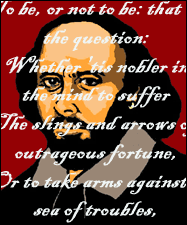Why Poetry?
Created | Updated Dec 30, 2011
As has often been stated here at the Post, members of the Alternative Writing Workshop do stellar work in fostering creative writing of all kinds. Here, Minorvogonpoet lets us in on some of her thoughts concerning the need for more poetry on h2g2.
Read, learn, comment below.
Why Poetry?

I like poetry but am aware of being in a minority. Many people who happily read, and write, fiction and factual prose regard poetry as something alien and frightening. Why? Maybe it's the memory of school, when you sat in lines and analysed poems by men who died a century or more ago. Maybe it's the endless arguments about whether poetry needs to rhyme or not. So what would I, the poetry lover, say to those who don't like poetry?
One of the problems with poetry is that no two people seem to agree about what it is. Every time you think you have nailed it down, you find something that doesn't quite fit and yet speaks to you and demands to be regarded as a poem. Carolyn Jess-Morley, in an article in Mslexia, caught this elusive quality when she described poetry as 'A bit like Big Foot: uncaptured, hairy, and overtheorised'. I would argue that it doesn't matter if we don't always agree about which pieces to call 'poems'. I see poetry as a garden, full of different flowers. Some people like the red flowers, some the blue, but the glory of the garden lies in its variety.
However, there are plenty of definitions of poetry. Coleridge said 'poetry = the best words in the best order'. That might be right technically, but it gives no indication of where those 'best words' come from. Robert Frost came closer in saying 'Poetry is when an emotion has found its thought and the thought has found words.' Because surely this is what poetry does: it takes the raw materials of emotion (and they can be raw) and finds words to express that emotion in a way that resonates with other people. It is surely no coincidence that people who do not normally read poetry turn to it in moments of crisis, as they do to prayer.
Poetry's ability to reach the deepest emotions may be related to its history. It is an ancient art, which grew up with dance and song among our early ancestors. Early poems would have been charms and chants, used by shamans to contact the spirit world and do magic. They were full of features to make them memorable: rhyme, alliteration, repetition and rhythm. As poetry came to be printed and read, the need for it to be remembered decreased, but those features remain important.
So does poetry have to rhyme? I suspect one of the reasons why poetry has fallen out of favour is that, in the twentieth century, it polarised between those that maintained it must rhyme, and those that said it never should. There is evidence that English poetry, at least, doesn't need to rhyme. Anglo Saxon poetry was alliterative, and that tradition continued into Middle English. Moreover, some of the greatest poetry in English is in blank verse. But I think the argument is rather sterile, as rhyme remains one of the poet's tools, to be used where it is effective. In my own attempts to write poetry, I find that some poems seem to work better if they rhyme while others don't.
Rhyming or not, poetry needs to be different from prose. As it is more compressed than prose, it needs to make the most of every word it uses. It needs to paint pictures with words, to exploit their emotional resonance and the rhythm of language. But poetry doesn't have to be highly serious; it can also be funny or frivolous. It crops up in advertising slogans and song lyrics, and the rhythms of poetry creep into speeches and good quality prose.
So, if you feel that you don't know much about poetry, take an anthology that combines modern as well as traditional and read some of the poems. Read them aloud, whether you shout or whisper them, and notice the patterns and pauses. Ask whether the words grab your attention, whether they move or surprise you, and whether they say something interesting about the human condition or the world outside. You may even find that you enjoy the experience.
Poetry and Stories by minorvogonpoet Archive
